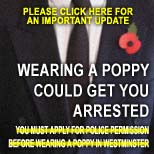posted by k
a useful glossary for present times
attack usually carried out by people who are neither us nor our allies, involves killing, injuries etc., deliberately inflicted
casualties dead and injured human beings, usually members of the army or other military organisation
ceasefire a pause or halt in killing people, or, according to Tony Blair (British Prime Minister) something people call for in order to feel better
damage, collateral dead and injured human beings who are neither members of the army nor of any other military organisation, often including a high number of children
defence like an attack but carried out by us or our allies. This too involves killing and injuring human beings deliberately
deployment moving soldiers to a position in which it will be easier for them to kill and injure people either directly or indirectly (c.f. infrastructure)
elements, rogue soldiers working for us or our allies who have reached the conclusion that killing and injuring enemies, possible enemies and anyone else in their way is approved by commanders and governments
evacuation urging people to move from a conflict zone (q.v.), leaving behind their homes, possessions, livestock, pets, etc. Note that this is not always possible because roads may have been bombed. Evacuees may, if unfortunate, become “collateral damage”
grief omitted as reference is inappropriate in a conflict situation
incursion, pinpoint soldiers injuring and killing people with some idea of the point they wish to reach and/or particular people their government would like them to kill. People between the original position of the soldiers and the target they have pinpointed are likely to become “collateral damage”
infrastructure means of keeping people alive or in communication with one another, often the target of e.g. pinpoint incursion or aerial operation. Infrastructure may include means of supplying food, clean water, heating, etc. People are killed and injured as a result of damaged and destroyed infrastructure. However, as they die of starvation, drought, disease, etc., they do not count as “collateral damage” and are therefore insignificant. People killed by destruction of infrastructure are predominantly very young, very old, sick or disabled
limited describes any attack short of all-out nuclear war. It may also be used to describe all-out nuclear war but this has not occurred yet
operation, aerial, ground, troop, etc pre-meditated killing and injuring of human beings by means of bombs, armed soldiers in tanks, etc. The term conjures up the idea of a kindly surgeon but may, sadly, entail “collateral damage” if people are unwilling or unable to evacuate themselves in time
outbreak the beginning of an episode of intensive killing. The word “outbreak” creates a comparison with disease, suggesting that what has occurred is inevitable, even though it never is
rendition, extraordinary moving human beings, in secret, from a democratic country in which they have some legal protection to another in which they can be tortured or killed without anyone – except the security services of the democracy and the torturers – knowing what has happened
sortie, operational attack or more usually (because carried out by us or our allies) defence in which people are killed or injured. Some of the people affected will be “collateral damage”
strike, surgical like a pinpoint operation but usually a matter of bombing large areas including an agreed target. Collateral damage usually occurs but is always regrettable
torture causing agony to another human being possibly with life-long effects (although the life in question may not be long). Of course, despite extraordinary rendition (q.v.) this is done only by enemies and never by us or our allies, excepting the surprisingly large number of “rogue elements” (q.v.)
wave not a friendly gesture or natural force but a large number of soldiers preceding and/or following another large number of soldiers in an attempt to kill or injure human beings
zone the area within which killing and injuring occurs, sometimes known as “the killing zone”. If human beings do not evacuate themselves from this area, they risk becoming “collateral damage”


